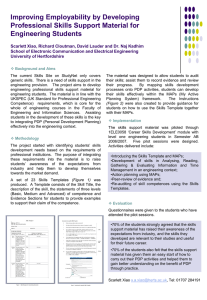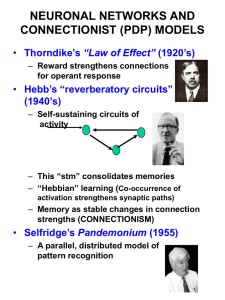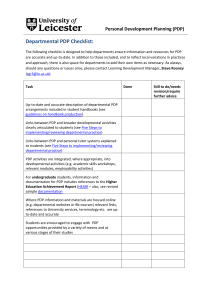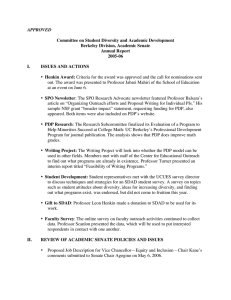The Future of PDP Policy Paper
advertisement
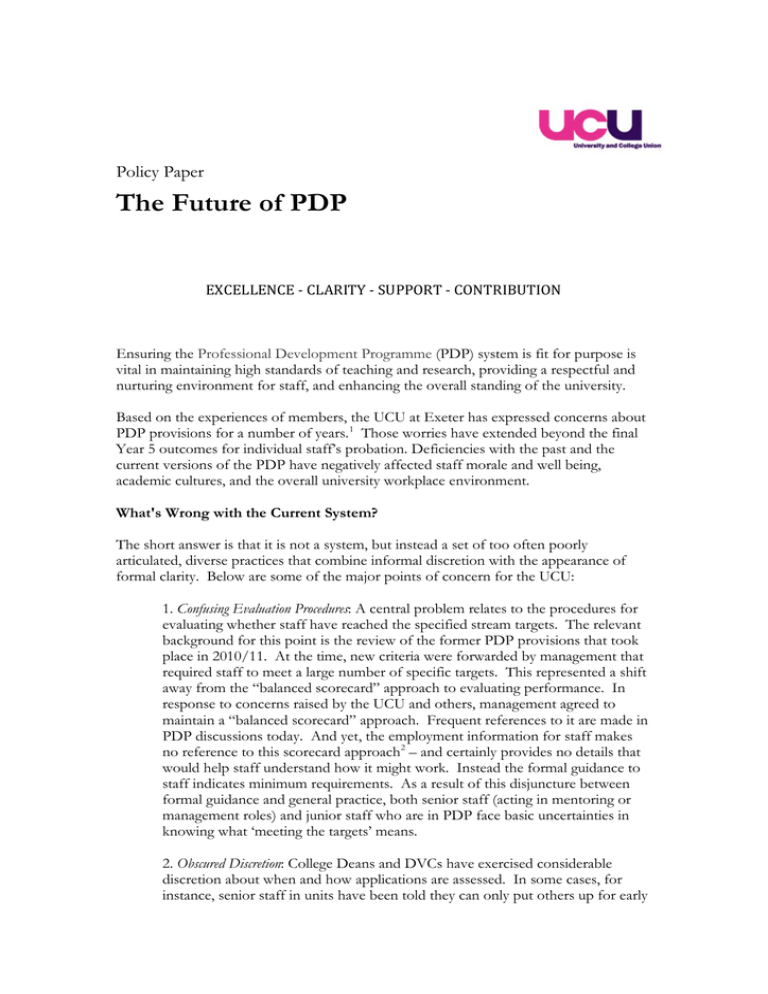
Policy Paper The Future of PDP EXCELLENCE - CLARITY - SUPPORT - CONTRIBUTION Ensuring the Professional Development Programme (PDP) system is fit for purpose is vital in maintaining high standards of teaching and research, providing a respectful and nurturing environment for staff, and enhancing the overall standing of the university. Based on the experiences of members, the UCU at Exeter has expressed concerns about PDP provisions for a number of years. 1 Those worries have extended beyond the final Year 5 outcomes for individual staff’s probation. Deficiencies with the past and the current versions of the PDP have negatively affected staff morale and well being, academic cultures, and the overall university workplace environment. What's Wrong with the Current System? The short answer is that it is not a system, but instead a set of too often poorly articulated, diverse practices that combine informal discretion with the appearance of formal clarity. Below are some of the major points of concern for the UCU: 1. Confusing Evaluation Procedures: A central problem relates to the procedures for evaluating whether staff have reached the specified stream targets. The relevant background for this point is the review of the former PDP provisions that took place in 2010/11. At the time, new criteria were forwarded by management that required staff to meet a large number of specific targets. This represented a shift away from the “balanced scorecard” approach to evaluating performance. In response to concerns raised by the UCU and others, management agreed to maintain a “balanced scorecard” approach. Frequent references to it are made in PDP discussions today. And yet, the employment information for staff makes no reference to this scorecard approach2 – and certainly provides no details that would help staff understand how it might work. Instead the formal guidance to staff indicates minimum requirements. As a result of this disjuncture between formal guidance and general practice, both senior staff (acting in mentoring or management roles) and junior staff who are in PDP face basic uncertainties in knowing what ‘meeting the targets’ means. 2. Obscured Discretion: College Deans and DVCs have exercised considerable discretion about when and how applications are assessed. In some cases, for instance, senior staff in units have been told they can only put others up for early promotion if “all the boxes have to be ticked” whereas the “balanced scorecard” comes in at five years. This has not been the practice on other occasions. In some cases, senior staff have taken account of individuals accomplishments before formally starting at the university. This has not been the practice on other occasions. Then there is the additional complication of what happens if some of the PDP targets are not met within the allotted time period. Again the procedures and expectations for this are unclear and, on the basis of previous experiences of the UCU, subject to varied treatment guided by largely indiscernible rationales within senior management. 3. Unclear and Unrealistic Targets: Many of the current listed targets need revision. The target that received most sustained criticism from academic staff is one indicating that at the fifth year those on PDP should have secured research funding at a level consistent with their College’s FTE income target. This is neither realistic nor equitable across all Colleges. For many reasons, the pool of funds available to junior scholars is shrinking and funding agencies have made it clear that, while all funded research will be of top quality, not all top quality research will receive funding -- there is simply not enough money for that. This target also places an exceptional burden on junior staff, one that typically exceeds what is expected from senior staff. Reflecting the discretionary manner in which criteria are evaluated, experience suggests that it is only on some occasions that the target for income is treated as a requirement. Within many Colleges, for instance, figures of average FTE income targets are not even made known to staff. On other occasions, staff have had 3 or 5 year target applications rejected in relation to this criteria - even if they have brought in considerable sums of money to the university (for instance through bringing with them successful postgraduate programmes, attracting significant PhD students, or securing deemed 'non-research' grants or non-FEC grants). Herein, it would appear that a certain understanding of ‘external research income’ is often -- and more and more so over time -- treated as the criteria. When this is done it diminishes the regard given to other forms of contribution to the university – whether that relates to publications or teaching. Staff have reported being reluctant to take on needed duties within their units in order to direct their attention to this one target. The securing of research grants might well be held as important, but this should not be to the exclusion of other forms of excellence and contribution. Uncertainty about the standing of this target leaves many probationary staff fearful that their contracts will not be renewed after five years. Experience reported to the UCU would suggest that the university has lost a very substantial number of excellent young academics (often to universities ranked higher in national and international ratings) because they were concerned they might not meet the PDP standards, though in fact they would have done so. Experience reported to the UCU indicates some staff currently at the university are looking for employment elsewhere because of the vagaries of PDP practices. Exeter UCU PDP Principles In relation to the finding of the recent Task & Finish Group on PDP as well as future initiatives within the university, the UCU advocates the following principles: EXCELLENCE: Achieving academic excellence is an important goal in itself as well as vital in ensuring the University of Exeter meets the current challenges facing HE. The UCU believes the university should seek to move the PDP and promotion criteria away from ‘performance management’ models, which require the individual to match their activity against ‘university targets’ (often meaningless in their generic quality and prone to fluctuate according to managerial ‘fashion’), towards the achievement of the wellestablished academic goals in teaching and research which form the basis of a successful long-term academic career and which are recognised both by the staff themselves and by potential peer reviewers both within and outside the institution. CLARITY: New members of staff should have a clear idea of what probation and progression entail when they sign their contract. They should also have a sense of the process and possible outcomes in the case they are judged not to have met the targets. To date, many staff have expended much energy and time seeking clarification about their individual situation, too often without success. It is the responsibility of management to ensure staff have a reasonable understanding of the expectations for performance, not the responsibility of (especially junior) staff to make sense of unclear targets and confused procedures. Likewise staff currently at Exeter that started at the university believing their overall contribution would be judged by a 'balanced scorecard' should not have this changed without notification through discretionary (informal) policies adopted by individuals within management. It is a failure of PDP provisions to date that staff have joined the university under one set of expectations, only to find the goalposts have shifted without notification after they arrived. Transparency for new staff in their progress towards confirmation/promotion (whether or not we keep the current PDP model) should be paramount then, as also in later promotion systems, with heavy emphasis on peer review both internally and externally (requiring proper input from colleagues, especially regarding teaching and organisational achievements, not merely a top-down judgement). SUPPORT: The UCU recognises that decisions about promotion and probation cannot be reduced to a box ticking exercise. What is therefore imperative is to ensure robust and responsive process of discussion between PDP staff, senior discipline academic staff, and College level management. At minimum, PDP staff should receive yearly updates (more frequently if needed) regarding their progression. Heads of Disciplines and College Deans should provide written feedback about what target areas need improvement and outline general expectations about what kind of activities would be needed for staff to progress. What, if any, role Academic Leads should play in assessing performance should be clear. CONTRIBUTION: Attempts at individual performance management and reward which are not experienced by staff as appropriate and supportive even to their individual expertise and career ambitions, much less their work as part of teams. Whether or not this has helped Exeter in its recent improvements (and we would argue that these improvements have occurred despite, not because of, these developments, largely through staff effort), we maintain that such an emphasis is definitely inappropriate to meeting the challenges Exeter now faces. Therefore, it is of vital importance all the contributions of staff be considered when making probation and promotion decisions. Decisions to reject applications on the basis of not having met the 'College’s FTE income target' should be revised. On this issue of future expectations for external research income, the UCU maintains that as a general rule, staff should be evaluated on the basis of their submitted grants, not on the grounds on whether they actually receive funding. In other words, the grounds should be academic quality (as is the case with publications). Otherwise, in light of current funding provisions, probation will be tantamount to a lottery. In those units where significant levels of external income is absolutely essential, receipt of research grant might be justified. However, this should be the exception rather than the rule and expectations should be clear to staff from the time they are appointed. 18 January 2014 Notes See as well the The 2012 Staff Survey Group Report identified significant concerns in commenting: Some junior academic staff on the 5-year probation programme (PDP) (longer than at other universities) report finding the process very stressful, particularly when the completion of the probationary period is not managed well, or if it involves unclear and inconsistent target criteria. This can leave staff feeling isolated and uncertain about their future. Some expressed the view that the institution is fundamentally exploitative of younger staff members (pg. 12). 2 At http://www.exeter.ac.uk/staff/employment/academicroles/youteachandresearch/lecturer/professionalde velopmentprogrammepdp/ 1
